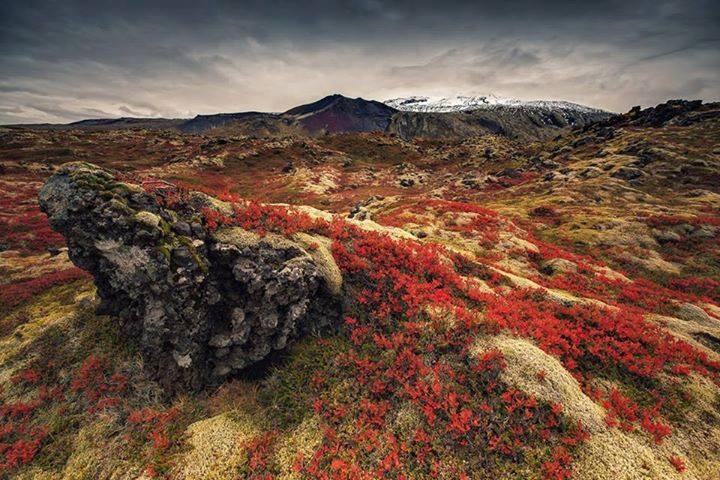Iceland is renowned as a ‘green’ country in many ways, yet it certainly does have its dark sides in terms of environmental impact. The nation’s highly consumerist ways leave an astoundingly large environmental footprint. The country does extremely well in terms of geothermal power usage but import and export out of the country, unfortunately, leaves an enormous carbon footprint. In fact, Iceland is one of the ‘leading’ countries in terms of the release of greenhouse gases, as it releases the fourth highes amount of greenhouse gases out of all countries in the world. It is not all doom and gloom, however, as Icelanders have increasingly recycled in the last couple of years as well as the government cutting back on the use of landfills to handle municipal waste.
Jukka Heinonen, a professor of environmental engineering at the University of Iceland, warned of the environmental impacts of the high levels of consumption in the country in a recent study. In the report, he warns of the global effects daily consumption in Iceland has. “Iceland is a rich country where the emphasis is on consumption. Everything is imported and it has been revealed that Icelanders have an enormous impact on the globe with their consumption habits. The country releases a lot of greenhouse gases in comparison with other countries in the world”. Iceland has the fourth highest release of greenhouse gases as it comes in behind countries such as Luxembourg, the United States of America, and Singapore. Jukka preaches the support of domestic manufacturing of goods as it is the most sure-fire way to decrease the release of greenhouse gases.
A recent study performed by the Environment Agency of Iceland revealed that Icelanders waste a large amount of food each year. The numbers for the year 2016 were quite staggering as every resident in the country throws away 23 kilograms of food that is fit for consumption. Furthermore, each person throws away 39 kilograms of spoiled food, 22 kilograms of cooking oil and fat, and 199 kilograms of drinks. These numbers rank quite similar to studies performed in other European countries, yet Icelanders throw away drinks in large magnitudes. Our European counterparts throw away 15 kilograms per year on average which seems a pittance in comparison the staggering amount of 199 kilograms Icelanders throw out. Restaurants in Iceland throw out 40 thousand tons of food per year. Residents have called for a revision of the legislature surrounding food waste, as some say there should be a total ban on the practice.
Icelanders have taken recycling more seriously in recent years as the nation is clearly lagging behind other nations in this matter. Waste is unsorted in many areas in the country but special sorting bins have popped up in larger numbers recently. There are 74 municipalities in the country and each one is responsible for their own waste disposal. The Icelandic Audit office pointed out in 2016 that there was no monitoring of their performance in waste management. The bad news for recycling enthusiasts, and those looking to diminish their carbon footprint, is that paper and plastics are shipped out of the country for recycling. Paper, both corrugated or mixed, is shipped to Holland where it is sorted further and then even shipped on to other destinations for recycling. Plastics are likewise transported to Sweden where they are sorted and then shipped on to further destinations. Metals are sorted here in the country and then shipped out for recycling as well. Glass is at this point in time put into landfills as it is considered too cheap to warrant shipping abroad. Constructing recycling facilities in the country has been mentioned as a prospect to reduce the environmental impact of the nation.
Iceland has improved in some facets of waste management as positive strides have been made in terms of recycling as well as the decrease of landfills. Recycling and composting have increased from 13% to 61% between the years of 1995 to 2008. It is quite the jump in such a short amount of time as Icelanders have increasingly taken the matter of recycling seriously. Landfills have historically been the main way to treat waste in the country but the use of landfills decreased drastically in the last 13 years as landfill usage decreased from 80% to 36% in between 1995 and 2008.
The Icelandic populace has increasingly called out for improved handling of waste and that the nation leaves a smaller environmental footprint. Initiatives such as Plastlaus September (Plastic-Less September) have started as well matters of the environment and recycling being researched more in the last decade or so. The average total waste generation has been increasing steeply in recent times as there was a 49% increase in between the years of 1995 to 2007 (from 390,000 tonnes to 580,000). Another steep increase happened in between 2007 and 2008 as the country went from a waste of 580,000 to 720,000 tonnes. It is clear that there are pressing waste management issues to look at for the near future in Iceland.
Source: http://bit.ly/2xIcvF9











